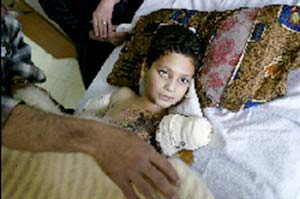Dr. Imad Najada, the attending plastic surgeon, said skin would be grafted from Ali's buttocks and back, which were largely unaffected. He added the boy was getting substantial amounts of antibiotics, plus pain relievers and fluids for dehydration. The boy cried and screamed when he was carried into an elevator and then to an intensive care treatment room. He continued screaming when doctors lifted his T-shirt to examine his burns - and again when doctors put IV needles into what was left of his arms. "I'm still not able to visualize his back because he's in pain," Najada said shortly after the boy arrived. "He said, 'don't touch my abdomen. Don't touch my abdomen. I feel in pain,'" Najada said. Initial reports said the boy had been burned on over 60 percent of his body, but Najada said it was 20 percent. The boy was accompanied to the hospital by an uncle, Mohammed al-Sultany, who told reporters he was thankful for Kuwait's help. He also said 16 members of the family were killed in the bomb. Najada said doctors would check the boy's tissue to see how much of it can be used for skin grafts. If there isn't enough, synthetic skin can be used, he said. "He's alright. He's stable," Najada added. Recovery from such a severe burn often takes about a year, and the cost runs into the hundreds of thousands of dollars. Several charities from around the world have offered to help with the expenses for the treatment and prostheses. Najada said four other Iraqi children are being treated at the hospital with war-related injuries such as a lost eye and a gunshot wound in the lung.
|
